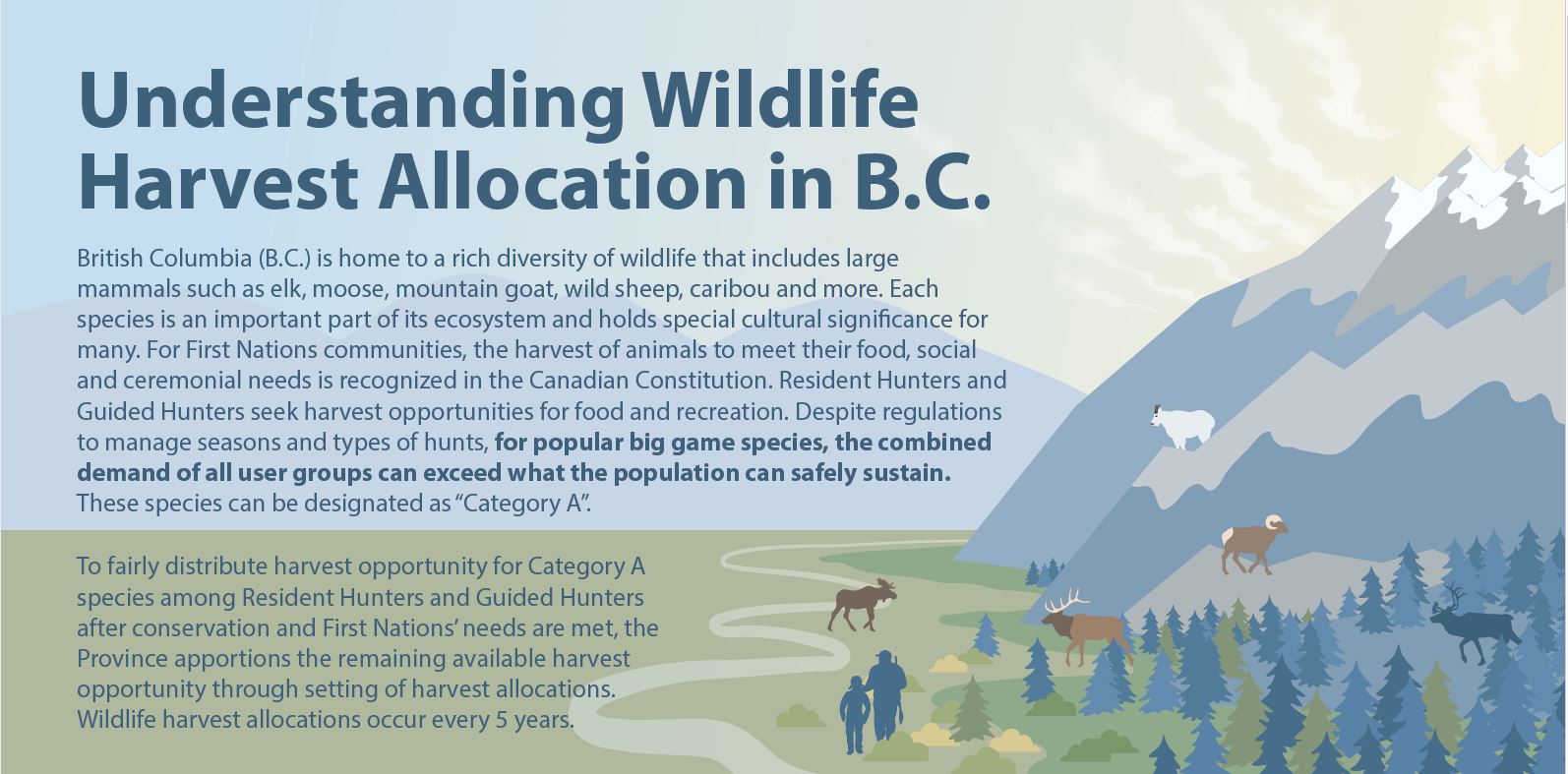Wildlife harvest allocation
Wildlife harvest allocation is the process of dividing the available harvest of a wildlife population between user groups (resident hunters and guided hunters), following wildlife stewardship priorities:
- Wildlife conservation and sustainability
- First Nations’ needs for food, social and ceremonial purposes
- Resident hunting opportunity
- Non-resident hunting opportunity
Wildlife Act regulations define hunting opportunity through hunting seasons, animal classes and hunt types to ensure sustainable harvest. Despite regulations, the combined interest of licensed hunters for some big game species exceeds what the populations can sustain. These hunts can be designated as "Category A".
To fairly and predictably distribute harvest opportunity of Category A hunts, after accounting for conservation and First Nations’ needs, the Province divides the available allowable harvest by setting harvest allocations for resident and guided hunters.
Allocation splits
The B.C. government’s harvest allocation policy applies to the big game hunts defined as Category A in the harvest allocation policy.
The proportion or “split” of the allowable harvest for Category A hunts for resident and guided hunters is also defined in the harvest allocation policy to inform stable and transparent decisions.
| Region | Species | Resident Split (%) | Guide Split (%) |
|---|---|---|---|
| 1 | Bull Elk | 85 | 15 |
| 1 | Either Sex Elk | 85 | 15 |
| 2 | Bull Elk | 80 | 20 |
| 3 | Mountain Goat | 65 | 35 |
| 3 | Moose | 85 | 15 |
| 3 | Big Horn Sheep | 70 | 30 |
| 4 | Big Horn Sheep | 60 | 40 |
| 4 | Mountain Goat | 65 | 35 |
| 4 | Bull Moose | 80 | 20 |
| 5 | Moose | 75 | 25 |
| 5 | Bull Caribou | 75 | 25 |
| 5 | Mountain Goat | 65 | 35 |
| 6 North | Thin Horn Sheep | 60 | 40 |
| 6 South | Moose | 75 | 25 |
| 6 North | Moose | 75 | 25 |
| 6 South | Mountain Goat | 65 | 35 |
| 6 North | Mountain Goat | 65 | 35 |
| 6 North | Caribou | 75 | 25 |
| 7A | Bull Moose | 77 | 23 |
| 7B | Mountain Goat | 65 | 35 |
| 7B | Antlerless Elk | 98 | 2 |
| 7B | Bison | 82 | 18 |
| 8 | Bull Moose | 80 | 20 |
| 8 | Big Horn Sheep | 70 | 30 |
| 8 | Mountain Goat | 65 | 35 |
Allocation applies to areas of the province that are regulated by hunting seasons and covered by guiding territories. In areas of the province not covered by guiding territories, the available harvest will be for resident hunting opportunity only.
Harvest Allocation Policy and Procedure
The Harvest Allocation Policy and Procedure (2019) was guided by input from the Allocation Working Group with representatives from government and stakeholder organizations. These documents may contain references to previous ministers or ministries responsible for wildlife at the time of publication. Periodic transfer of authority for natural resource management may not be reflected in these documents.
The Category A hunts and allocation splits were set by the Province in 2015 following a review of the wildlife allocation process and recommendations put forward by the Allocation Working Group, stakeholders and government experts.
The harvest allocation policy and procedure inform consistent allocation decisions across the province, while allowing for the Director and Regional Managers to use defensible methods of determining allowable harvest and allocation appropriate for species in their region.
Supporting policies and procedures
For additional policies and procedures that support harvest allocation, see: Wildlife Policy.

